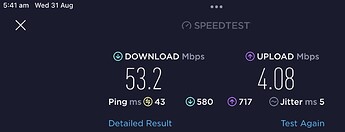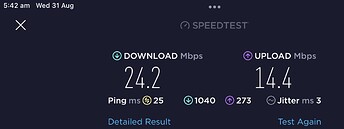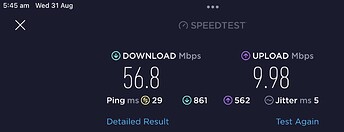My internet provider has just advised me that my monthly plan will increase shortly, but I can change to wireless internet for my old fee.
Unlimited data and claims a faster speed, but no phone which doesn’t worry me. Is it as reliable as NBN based? Does speed fluctuate much too?
It is hard to say without more information. What is the plan you have in mind? Where are you in relation to the wireless node you would connect to?
My alarm uses mobile service for B2B monitoring and prior to adding an external (outdoor) antenna it routinely fluctuated between 4G and 3G (1 or 0 bars!). Even the indoors configuration had better antennas/modem than any mobile phone. I am located in Eltham Vic about 1km from the towers with a hill between us.
NBN is often unreliable in some locations and wireless/mobile service is often unreliable, poor, or non-existent in some locations.
If the proposed mobile signal and network used is strong (4/5 or 5/5 bars on your mobile) and consistent it could be better than NBN. If your mobile signal fluctuates between 4G, 3G, and HSDPA it will most assuredly be a very poor experience excepting as a last resort backup.
Because mobile signals can be fine in your lounge but not in your den there is no way to accurately advise.
My parents had a similar offer from TPG…using their local underutilized 4G network. They decided not to switch from NBN connection as they wished to retain their landline and because they live on a ground floor unit, mobile signal isn’t overly reliable (signal strength varies around their unit and signal strength fluctuates).
A couple of things to consider.
-
If you use the same provider for your mobile, check what the signal strength is around your home. If signal isn’t good, it may impact on your speed and connection reliability. This can be done by placing your phone at locations you might sit the 4G router. It will give an indication of strength with standard router aerials.
-
Also investigate consequences (esp. cost) if you find it unsuitable and wish to revert to NBN.
-
Read their policy about reasonable/fair usage terms, especially if you are a heavy user (watch a lot of streaming services at UHD or are heavy data user).
-
If you play online games, ask what latency times are compared to your existing connection. Longer latencies can impact on experience with role playing games.
-
Like NBN, more users connecting using the same method, the greater the impact on speed and connection reliability. Try to see if they will provide some sort of commitment to speed and reliability before you commit.
Thanks for those comments and test advice. I do not use the same provider for my phone, ( Telstra for the phone) but I get 2 bars from it usually. Although suburban Sydney, it is not a great area for digital radio or TV reception.
I will look into the situation of reverting if it is not satisfactory.
I am not a heavy user; sometimes stream movies but not gaming.
I expect TPG is trying to get away from their NBN costs, but if more people take up the option to wireless it will reduce speed and reliability from what I understand from your comments.
Gaming isn’t internet usage intensive unless downloading the installation data. Most of the data is stored on the pc you are using and only small amounts of data need to be exchanged for game play.
Streaming movies is much more data intensive, a UHD movie will typically require around 5 gigabytes of download, HD around 3 gigabytes…gaming in perspective to this for around the same time may only use 100 megabytes or less data.
If you get a lot of buffering while watching streaming content, this can be because of intermittent failure of the signal or the data stream being below the amount required to produce smooth streaming if using wireless networking.
TPG merged/purchased Vodafone hence they are looking to maximise their return on that merger.
We received a similar offer for our near inner city Brisbane home. The marketing ploy was to offer unlimited data and faster speeds than our current NBN plan. Our NBN service is connected via HFC. Not the best NBN service, but better than most. It would be futile to change the connected NBN service which can be upgraded to superior performance overnight just by changing speed tiers/plans and or provider.
The NBN HFC service comes with a level of speed assurance, unlike the Fixed Wireless NBN or data over a mobile phone providers network. My recollection of the TPG offer was the device needed to be permanently located in your home. It’s not the same as a mobile broadband device which one can use anywhere on their network.
Depending on where one resides in Sydney it would pay to check whether there is a strong signal from Vodafone before committing. My experience with using Optus mobile data (iPhone) and Telstra (4G mobile data modem) suggests results can vary. I’ve seen Telstra struggle to deliver ADSL speeds (time of day and signal strength affected) while on a good day speeds bettered 50Mbps. Optus possibly not as popular has returned even higher speeds, subject to the location (signal strength) and time of day. I’ve no first hand experience of Vodafone, although one of the family uses their network.
Thanks for your comments and sharing your experience. It looks like the same deal I was offered. I don’t have a Vodafone user in my family but will try to seek one out.
I am generally ok with my NBN internet although slow at times.
More investigation for me now.
Late to this thread… I’d be looking at a different provider. My phone is currently with Woolworths (Telstra) and only gets one bar… I can make and take calls but quality is patchy. I’m switching to GOMO (Optus) which I trialled earlier in the year and found it to be quite good, but didn’t switch totally at that point, having already paid for a long term plan with WWM.
Having said all that, there is no way in the world I would change to a wireless solution for internet, its just not as stable as the alternatives. I’m assuming your NBN is FTTN 12… that is slow anyway. You really should check out other providers for your connection, and make sure you are on the right plan for your usage. Look into Exetel and Launtel… you don’t hear much about them but they are good, both of them, and are not the most expensive on the market. I’ve been with Exetel for nearly 9 years now, and for the most part it has been painless. I’ve always had good speeds, close to what’s advertised (but I am relatively close to the local node)…
Note that the RSP servers seem to only make a minor difference to internet performance. A few percent between them. No matter which RSP one choses the limiting factor appears to be the NBN link to their home. The biggest differences are in their call centres, reliability, and how long they are down at a time. Some have lots of short interruptions and other fewer longer ones but all have some, often at the most irritating times. They seem to be (from the ACCC broadband reports) fairly similar at slower NBN speeds (12, 25, 50 mbps) than at the higher ones (100 mbps and above) where their server capacity gets tested.
As for gaming, although not something you might do for clarity and as @grahroll mentioned it is not often data intensive but multi-player games are very much latency (time to transmit/receive packets) dependent and for serious gamers every millisecond can make a difference. Not an issue for one player games.
Your investigation might benefit from confirming which NBN technology has been provided to your home.
The NBN has committed to ongoing upgrades of a portion of the premises with poorly performing NBN. Your property may be one of those likely to receive an NBN upgrade. Mostly premises connected to FTTN (Fibre to the Node). I don’t believe the NBN has a definitive list of the premises it is intending to upgrade. One of the Community may be able to clarify. See appended note at end of post.
Note:
FttN is connected in the home through the old incoming telephone copper line. This is the most common type of service provided to freestanding homes/premises in the urban sprawl of our largest cities. If this is how your urban home setup appears it is most likely what has been provided.
The performance of FTTN depends on the distance by copper wire link your home is from the node the service connects to. Your RSP should if asked honestly answer for FTTN connected customers the length of that connection and maximum indicative speed possible to your premise. The condition of that copper line will also influence the quality of the NBN service you receive.
Premises in newer housing estates are less likely to have issues with the line quality. The decision by the government of the day to permit the reuse by the NBN of the copper phone network for a large portion of the NBN services perpetuated the same line quality problems customers experienced on the previous ADSL based internet services.
Note re NBN upgrades 2022/23.
Blockquote Optus possibly not as popular has returned even higher speeds, subject to the location (signal strength) and time of day."
Part of the potential issue is the number of users sharing the same available bandwidth and cell processing power.
It’s a shared experience regardless of provider.
As to relative performance between providers, a random sample at 5:40am on a weekday morning. Same time and approx same square meters for signal.
NBN Fixed Wireless
Telstra 4GX mobile broadband, Netgear wireless data modem.
Optus 4G LTE mobile, iPhone tethered.
YMMV!
I’ve recorded better from Telstra, less from Optus and far less from the NBN. I suspect performance at 1am is much better from all 3, and factually less between 4pm and 10pm in the evenings. Weekends deliver the slowest speeds. Possibly due to the need these day to use subscription services to watch your favourite sport/teams.
There is no easy answer for those with similar circumstances. At times the near defunct ADSL2 over the phone line can deliver a superior streaming service! I’m not crazy, but have invested briefly in comparing the various options. What ever choices I delete, doubtless the future will conspire to make it the least best choice. ![]()
As said in other replies here, the signal has an awful lot to do with wireless performance. In my situation I can only use wireless internet. 10+ years experience; my evening speed is approaching 250 Mbps which is close or better than the NBN. If my signal drops the Google Hub screen or my PC lets me know very quickly. My dropouts are less than 3 per year, and last for 1 - 5 minutes. I am 300 metres from the tower on a Telstra account.
My nbn™ speed approaches 1,000 Mbps even in the evening. This is because we have fibre to the premises, this fibre connection is what most Australians should have been enjoying. Coupling that wired speed with our household wireless network allows us to enjoy in house wireless speeds in excess of 600 Mbps in all our property.
Sadly most Australians have been let down by election choices which gave us the MTM nbn™ system which compares very poorly to even marginal 4G services in many places.
The very term, NBN, makes no sense at all. It is really a political marketing name.
What you get in terms of reliability and bandwidth on “NBN” will depend on what technology you are actually using, which in turn depends on what is available to you in your area.
Likewise, “wireless internet” does not narrow it down to what technology is actually being proposed.
Of course ISPs like all this too. It keeps consumers in the dark and gives ISPs wiggle room.
This is what my ISP (Westnet) had in the fine print for fixed wireless internet. I stayed with my normal NBN connection.
What is CG-NAT and how does it affect Home Wireless Broadband services?
Techy types should be aware that Home Wireless Broadband uses CG-NAT. Carrier-grade NAT (Network Address Translation) is a type of network that assigns services with a private IP address, instead of a dynamic public IP address. Our network will then translate that private address into a public address. This means that the following items (which depend on internal NAT) will not work on Home Wireless Broadband:
Port forwarding
Hosting web, email or file servers internally
Smart Home systems (e.g. accessing security camera footage remotely, home automation and printers)
Remote Access (i.e. accessing your home computer or devices from another location)
If you need any of these items in your home setup, Home Wireless Broadband won’t be the right fit for you. Please check your address on our website for one of our other great broadband plans.
A user however can use DDNS to circumvent these limitations, anyone who has dynamically assigned addresses from their RSP can use DDNS to overcome this.
Is an alternative to pay for a fixed IP?
Does a fixed IP increase the probability of attempts to break into your home network?
For the average home owner how would they go about setting up DDNS? Any good links for newbies to the terminology, internet and technically inexperienced?
With the NBN FW does one need to use a hosted service?
There are free DDNS services, they usually just limit the number of addresses that can be served by the DDNS service eg 1,2, or 3 and anymore needs a paid product. As most households are using a single assigned IP (whether fixed or dynamic) a free service will be more than enough. Another point on the free services is that they usually require renewal every month before the expiry date, paid for service removes this requirement.
Recommendation of a service? I use one https://www.noip.com/ which I find works for me, others may have other preferences.
Does a fixed IP address mean more attacks? If you use a proper firewall (MS one is a good one so no need to pay for one) and you also use proper settings on your router/modem most attacks are rejected silently (the attacker doesn’t think that a port is there). So no more attacks than if using a shared address (one dynamically allocated).
Most businesses prefer fixed addresses as remote access is much easier for client machines, DDNS just means another step in the process and so a bit more effort on the part of IT staff. Benefits also include easier set up of alarms, websites etc. DDNS allows this and is just a bit more effort. So if it costs extra for a household to get a fixed IP then a little effort and a free DDNS service can shave a few dollars off. Most DDNS services also reject and protect against attacks so there may be a benefit there if someone is a preferred target.
If someone has been botted or are a spammer then another user using the same address when dynamically allocated to them may find that they become blacklisted as the address becomes blacklisted. This can be a pain, in this case using a DDNS service can resolve that issue more easily than asking SPAM Cop or others for removal from a blacklist.


